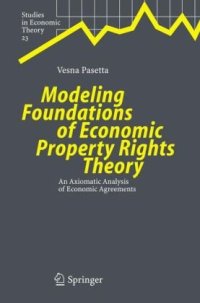
Ebook: Modeling Foundations of Economic Property Rights Theory: An Axiomatic Analysis of Economic Agreements
Author: Vesna Pasetta
- Genre: Economy
- Tags: Economic Theory, Operations Research/Decision Theory
- Series: Studies in Economic Theory 23
- Year: 2005
- Publisher: Springer
- City: Berlin; New York
- Edition: 1
- Language: English
- pdf
This is an introduction to the foundations of economic property rights t- ory (EPRT). In this volume, a ?rst step in the EPRT research program, rules concerningeconomicpropertyrights(e. p. r. s),entrepreneurialagreements,and enterprises are discussed. Introduced concept of e. p. r. s is an extension of the traditional concept of pairing of residual rights of control and residual rights of returns in the economic theory. Its importance in economics is generated fromageneralimpossibilityofmakingacompletecontract,concerninge. p. r. s, for any nontrivial economic transaction. The volume o?ers a theoretical - tension of mathematical economics, applying recent results of Hopf algebras, quasi-Hopf algebras, representation theory, theory of categories, and defor- tion theories, in looking for suitable mathematical methodology of economic property rights theories and foundations of general theory of economic agr- ments. The idea is to construct a kind of mathematical application in which any fundamental formal entity and/or operation has an empirical economic interpretation. This approach is seen as a way to cope with an extreme c- plexity of economic phenomena under consideration and requests for precise formulationofmodelswheremeaningfulanswersandsolutionsofproblemsare only those which are obtained rigorously. The proposed extensions in ma- ematical economics and property rights theory are to provide rich enough foundations to follow complexity of economic property rights in the exact way, and to identify where there is an appropriate method providing a- quate solution, and also to ?nd problems where in general there is no such methodology.
This book offers a unique, comprehensive, technically in-depth, and up-to-date treatment of modeling economic agreements by applying recent results of advanced algebras, representation theory, theory of categories, and transmutation theory. The importance of a new concept of agreements, as introduced here, is derived from a general impossibility of making a complete contract for any nontrivial economic transaction. The proposed extensions provide foundations rich enough to follow the complexity of economic property rights, including entrepreneurial agreements, clubs and transfers through the restructuring processes. The book is relevant for academics with a theoretical interest in economics, applied mathematics, mathematical economics, operational research and advance management of tangible and intangible assets. It provides full details and line-by-line proofs of all basic relations needed for research in modeling issues of economic property rights theory and economic agreements.